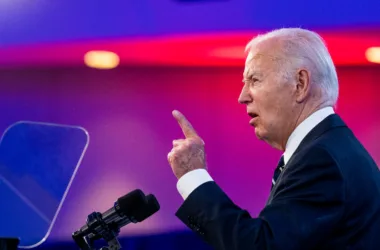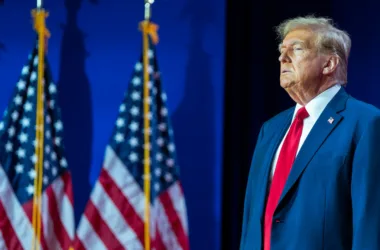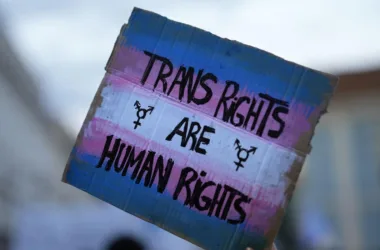The first debate of the Republican presidential primary showed the growing division in the GOP over laws restricting abortion.
Fox News’s Martha MacCallum, who co-moderated the debate, asked the eight Republican primary candidates how, or whether, they would seek to restrict abortion at the federal level. She said it “has been a losing issue for Republicans” since the Supreme Court overruled Roe v. Wade in June 2022 and sent abortion laws back to the states.
But anti-abortion groups also are pressuring policymakers to limit the procedure at the federal level, and it has become a top issue in the presidential campaign.
Former South Carolina Gov. Nikki Haley, who said she was “unapologetically pro-life,” said it would be unlikely that a federal ban would pass since it needs 60 Senate votes and a majority of the House. She said there needs to be a “consensus,” and that Americans need to “humanize the situation and stop demonizing the situation.”
Her husband, Michael Haley, was adopted, and she had trouble having her two children, Mrs. Haley said.
But other Republicans on the stage aimed their message at the evangelical, pro-life voters who are likely to dominate the nation’s first caucus in Iowa on Jan. 15, where all of them hope to shine.
Florida Gov. Ron DeSantis, who signed a six-week abortion ban in his state, said that he “believes in a culture of life.”
He said Democrats want to “allow abortion all the way up to the moment of birth,” and that Republicans will hold Democrats accountable for their “extremism.”
While he didn’t commit to a federal six-week abortion ban, Mr. DeSantis said he would support the “cause of life” as governor and president.
Other candidates also advocated for abortion limits, but some stuck to 15 weeks, which polls show is largely supported by voters.
Former Vice President Mike Pence directed his response at Mrs. Haley by saying that consensus is the opposite of leadership.
“Can’t we have a minimum standard in every state in the nation that says when a baby is capable of feeling pain, an abortion cannot be allowed?” Mr. Pence asked. He said it was time for a 15-week ban, an idea that some polls show is supported by 70% of Americans.
“Don’t make women feel like they have to decide on this issue, when you know we don’t have 60 Senate votes in the House,” Mrs. Haley responded.
Sen. Tim Scott of South Carolina sided with Mr. Pence and backed the 15-week ban.
“We cannot let states like California, New York, and Illinois have abortions on-demand up until the day of birth,” he said. “That is immoral. It is unethical. It is wrong.”
North Dakota Gov. Doug Burgum advocated for no federal ban, even though he signed a near-total abortion ban in his state.
“I’m a pro-life governor of a very pro-life state,” Mr. Burgum said. “This issue is, of course, very important. But I am on the record and I stand behind that we should not have a federal abortion ban.”
Mr. Burgum cited the 10th Amendment, which says powers not reserved for the federal government “are reserved to the states.”
The decision needs to be left up to the states, he said, because the “feds are stepping on people’s lives.”
Asa Hutchinson of Arkansas, who signed a near-total ban into law when he was governor, said the states will likely decide the issue, “but it’s certainly fine to be addressed at the national level as well.”
The governor said that he has signed 30 pro-life pieces of legislation in his state, which he labeled as the “most pro-life state in the nation,” but added that the state has worked on enhancing adoption services and maternal care.
Susan B. Anthony Pro-Life America is one of the pro-life groups advocating for a minimum 15-week ban. The group applauded the candidates who solidly announced their pro-life national-ban stance, and criticized those who didn’t believe in a national ban.
“Some were bold in sharing the plight of the unborn in half the country where brutal late-term abortions continue at any point in pregnancy for any reason,” the group said in a statement. “They understand that where you live should never determine whether you live.The position taken by candidates like Doug Burgum, that life is solely a matter for the states, is unacceptable for a nation founded on unalienable rights and for a presidential contender. Mike Pence, Tim Scott and Asa Hutchinson each offered a clear, bold case for national protections for the unborn at least by 15 weeks, when they can feel pain, which aligns with the overwhelming consensus of Americans.”
Some who oppose abortion limits have responded to the Republican hopefuls comments regarding abortion on X, formerly Twitter.
Both former Democratic Sen. Al Franken of Minnesota and former Biden White House Press Secretary Jen Psaki posted on X that “no one” supports abortion up to birth.
Planned Parenthood wrote on X, “‘Late-term abortion’ is a completely made-up phrase that has no basis in medicine. It’s pure anti-abortion propaganda, intended to confuse people about when abortion happens.”
But Democratic lawmakers have proposed legislation that would legalize abortion up until birth.
In 2022, Senate Republicans blocked a bill sponsored by Democrats that would have established a nationwide right to abortion at any stage of pregnancy.









